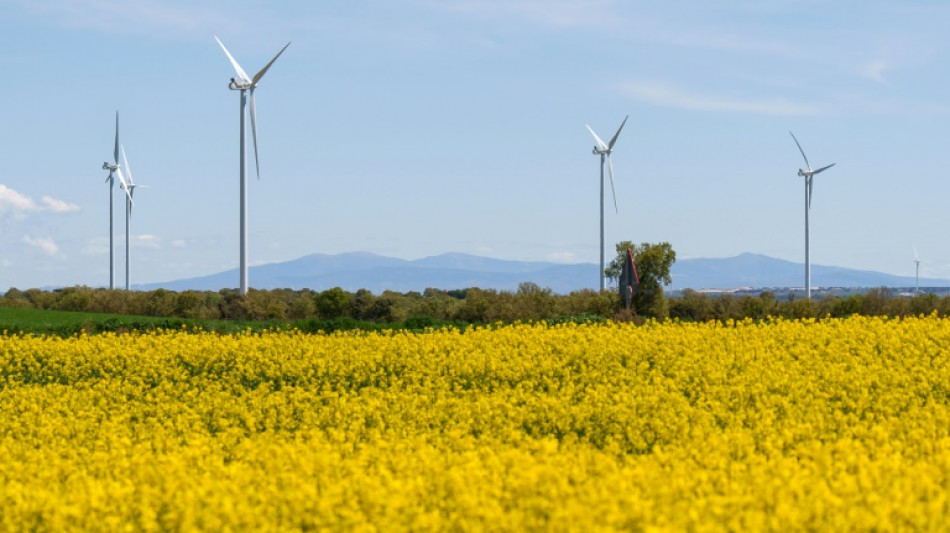
-
 Benfica investigate video of fans' monkey gestures
Benfica investigate video of fans' monkey gestures
-
French minister pledges tight security at rally for killed activist

-
 Guardiola 'couldn't care less' about Arsenal stumble in title race
Guardiola 'couldn't care less' about Arsenal stumble in title race
-
UK police search property as royals reel from Andrew's arrest

-
 Germany's Merz to visit China next week
Germany's Merz to visit China next week
-
Kompany says Mourinho made 'huge mistake' in Vinicius racism row

-
 X appeals EU's 120-mn-euro fine over digital content violations
X appeals EU's 120-mn-euro fine over digital content violations
-
Galthie recalls hulking locks Flament, Meafou for Italy

-
 Turkey, Saudi sign major solar power deal
Turkey, Saudi sign major solar power deal
-
US Olympic freeskier Hess embraces 'loser' tag after Trump blast

-
 European stocks rebound, oil prices ease after US-Iran volatility
European stocks rebound, oil prices ease after US-Iran volatility
-
'Alpha male' AI world shuts out women: computing prof Hall

-
 New Zealand freestyle skier Ives in hard Olympic crash
New Zealand freestyle skier Ives in hard Olympic crash
-
New Zealand must adapt quickly to Sri Lanka wickets: Chapman

-
 Thai activist's jail term for royal insult extended to 30 years
Thai activist's jail term for royal insult extended to 30 years
-
Families of Duterte's drug war victims eye Hague hearing with hope

-
 India chases 'DeepSeek moment' with homegrown AI
India chases 'DeepSeek moment' with homegrown AI
-
UN touts panel for 'human control' of AI at global summit

-
 Ukraine Paralympics team to boycott Opening Ceremony over Russian flag decision: statement
Ukraine Paralympics team to boycott Opening Ceremony over Russian flag decision: statement
-
UK monarchy reels from Andrew's stunning arrest

-
 Somaliland, where Muslims love Israel
Somaliland, where Muslims love Israel
-
Florida airport to be renamed after US President Donald Trump

-
 Fans flock to Japan zoo to see viral baby monkey Punch
Fans flock to Japan zoo to see viral baby monkey Punch
-
Stocks mixed, oil rises after Trump Iran threat

-
 Outspoken Laos lawmaker's election exit sparks rare dissent
Outspoken Laos lawmaker's election exit sparks rare dissent
-
Kim Jong Un vows to boost living standards as he opens rare congress

-
 Shepherd hat-trick to Samra ton: Five top T20 World Cup performances so far
Shepherd hat-trick to Samra ton: Five top T20 World Cup performances so far
-
Zimbabwe surprise as T20 World Cup Super Eights begin without Australia

-
 Victorious Takaichi promises 'strong and prosperous' Japan
Victorious Takaichi promises 'strong and prosperous' Japan
-
Ex-South Korea leader apologises for martial law crisis

-
 Ex-S. Korea leader apologises for martial law crisis
Ex-S. Korea leader apologises for martial law crisis
-
Messi kicks off MLS season in key World Cup year

-
 Teen burnout to Olympic gold: Alysa Liu 'looking to inspire others'
Teen burnout to Olympic gold: Alysa Liu 'looking to inspire others'
-
Cunningham stars as NBA-leading Pistons ease past Knicks

-
 Andre Gomes joins MLS side Columbus Crew
Andre Gomes joins MLS side Columbus Crew
-
Scottish inconsistency 'bugs everyone' says former international Beattie

-
 England turn to Pollock for Six Nations boost against Ireland
England turn to Pollock for Six Nations boost against Ireland
-
Arsenal aim to banish title jitters in Spurs showdown

-
 Scrutiny on Flick rises as Barca seek recovery
Scrutiny on Flick rises as Barca seek recovery
-
Leipzig host red-hot Dortmund with Champions League hopes slipping away

-
 Nvidia nears deal for scaled-down investment in OpenAI: report
Nvidia nears deal for scaled-down investment in OpenAI: report
-
Japan inflation eases in welcome news for PM Takaichi

-
 McIlroy shares Riviera clubhouse lead as Rai charges, Scheffler fades
McIlroy shares Riviera clubhouse lead as Rai charges, Scheffler fades
-
Philippines' Duterte earned global infamy, praise at home

-
 Stocks drop, oil rises after Trump Iran threat
Stocks drop, oil rises after Trump Iran threat
-
As European heads roll from Epstein links, US fallout muted

-
 Families of Duterte's drug war victims eye Hague hearing hopefully
Families of Duterte's drug war victims eye Hague hearing hopefully
-
Russian decision is a betrayal: Ukrainian Paralympics chief

-
 Venezuela parliament unanimously approves amnesty law
Venezuela parliament unanimously approves amnesty law
-
Martinez missing as Inter limp to Lecce after Bodo/Glimt humbling


Spain's blackout highlights renewables' grid challenge
The cause of last week's massive power outage in Spain and Portugal remains unclear but it has shone a spotlight on solar and wind energy, which critics accuse of straining electricity grids.
The rise of renewables presents a challenge for power grids, which must evolve to adapt as countries move away from fossil fuels.
- Maintaining stability -
Grid operators must ensure that electricity is constantly balanced between demand and supply.
A metric of this balance is the frequency of the electricity flowing through the grid, set at 50 hertz (Hz) in Europe and 60 Hz in the United States. If that number drifts too far off, it can jeopardise the grid.
Historically, the electricity system has relied on conventional power plants -- gas, coal, nuclear and hydroelectric -- that use spinning turbines to generate electricity.
These machines keep the frequency stable.
With their gigantic rotors spinning at high speed, they provide inertia to the system.
If a power plant fails or if electricity demand increases too quickly, they help stabilise the grid by releasing the kinetic energy stored in the rotors.
Instead of spinning machines, solar and wind farms use electronic systems that feed power into the grid, making it harder to maintain that delicate balance.
Renewable energy will have to do more than provide carbon-free electricity in the future, said Jose Luis Dominguez-Garcia, an electrical systems expert at the Catalonia Energy Research Institute (IREC).
They will have to "assist the system with additional controls to support the grid, particularly in inertia terms", he said.
Marc Petit, professor of electrical systems at top French engineering school CentraleSupelec, argued that moving away from fossil fuels would make hydroelectric and nuclear power plants "even more essential for stabilising the system" as they use rotating machines.
- Flywheels -
A range of technical solutions already exist to compensate for renewables' lack of inertia and hence to support grid stability.
These include gravity storage, cryogenic liquid air, compressed air and concentrated solar power.
As it undergoes a transition away from coal, Britain is banking on flywheels, a tried and tested system.
Surplus power from solar and wind farms is used to make the large wheels turn, creating kinetic energy.
This stored energy can then be converted to provide electricity to the grid if needed.
- No sun or wind -
Just before the massive blackout on April 28, wind and solar power provided 70 percent of Spain's electricity output. But renewables are intermittent sources of energy as they rely on nature.
When the wind stops blowing or the sun is hiding, other sources have to step in within minutes, or there need to be adequate systems for storing -- and then releasing -- renewables in place.
Depending on the country, backup supply currently comes from mainly thermal power plants (gas or coal), nuclear reactors or hydroelectricity.
To handle the ups and downs of renewable power, countries must ramp up storage capacity.
The most widespread method is pumped storage hydropower from water reservoirs.
But large stationary batteries, akin to shipping containers, are increasingly being deployed alongside wind and solar farms -- a segment dominated by China.
To meet the global goal of tripling renewable capacity by 2030, storage capacity will have to increase sixfold, with batteries doing 90 percent of the work, according to the International Energy Agency.
Another way to ease pressure on the system would be to shift electricity use -- for example when you charge your car battery -- to the middle of the day, when solar power is at its peak.
- Rescale the network -
Widespread blackouts "have virtually always been triggered by transmission network failures, not by generation, renewables or otherwise", said Mike Hogan, advisor with the Regulatory Assistance Project (RAP), an NGO whose stated goal is to achieve a clean, reliable, equitable and cost-efficient energy future.
Tens of billions of euros, perhaps hundreds of billions, will be needed to renovate ageing power lines and replace them with new ones that are more powerful.
The need to modernise or expand the lines is pressing as energy-hungry data centres are growing and factories are increasingly consuming electricity.
Countries also need to strengthen interconnections between their power systems.
Such cross-border links helped to restore power to Spain as France stepped in to share electricity during the blackout.
By 2028, exchange capacity between the two neighbours is expected to increase from 2.8 to 5.0 gigawatts, reducing the peninsula's relative electrical isolation.
L.Miller--AMWN

